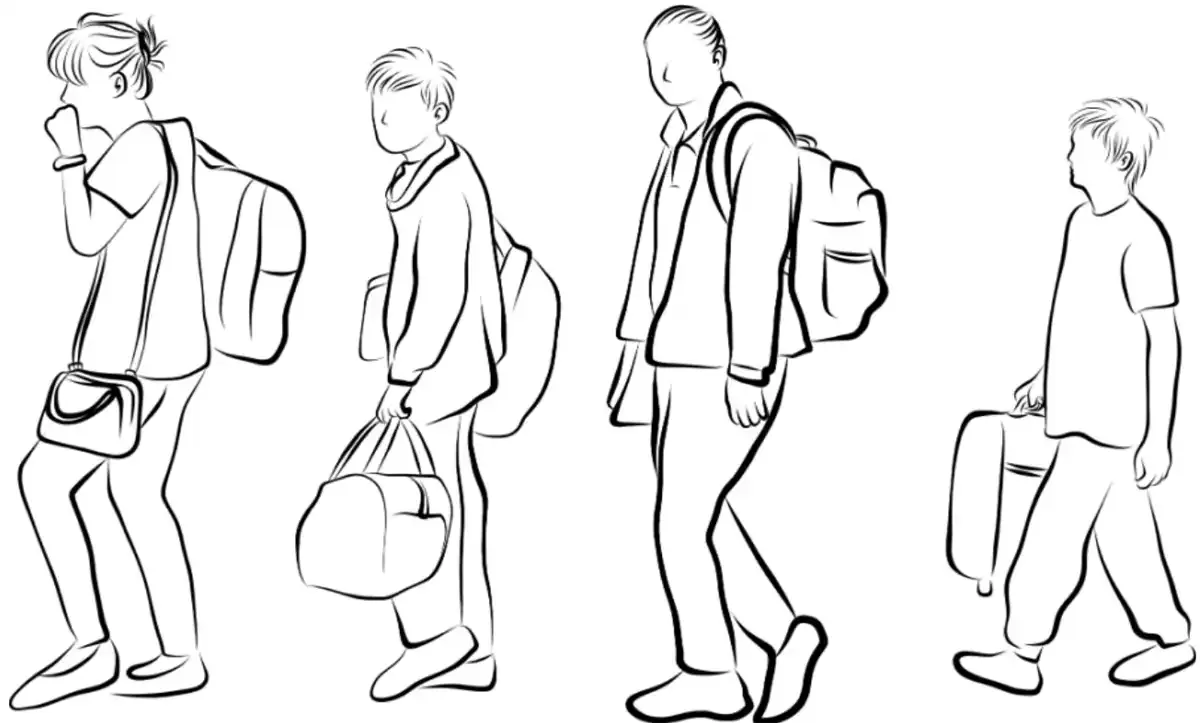The 1 Type Of Bag That Spine Doctors Would Never, Ever Carry - do you own any of these?

As a London-based female who likes to be prepared for anything, I typically travel with a complete kit.
I fill my tote bag with a spare jumper in case I get cold, a large water bottle so I’m never stuck in the tube without water, SPF moisturiser, a makeup bag for touch-ups, post pandemic hand sanitiser, plus all the usual suspects, including my wallet, sunglasses, keys, and more. When I have to commute to the office, I also take a laptop daily in addition to everything listed above.
My recent conversations with spinal docs at Wimbledon Chiropractic 7 Sports Injury Clinic have made me rethink this strategy.
“Overloading a bag with heavy items can be damaging to wrists, elbows, shoulders, or back, depending on where it’s carried,” explained Niall Marshall-Manifold, Doctor of Chiropractic and senior chiropractor at Wimbledon Chiro & Sports Injury Clinic. “Carrying less weight is always the priority. While you can change your bag to help distribute weight more evenly and comfortably, added weight will ultimately affect posture and gait.”
I tend to stuff all those items into a one-shoulder tote bag, making matters even worse. To adopt better bag-carrying habits, I sourced m info from some spinal professionals who help set the record straight on the best and worst habits for your body.
Improper bag use can have serious health consequences.
If you suffer from back pain, neck discomfort, or stiff traps, your bag might be to blame.
“When people wear an inappropriate bag, especially one that places undue strain on the spine, they will frequently develop shoulder pain along with lower neck and upper back pain,” Dr Luke Macyszyn, an American board-certified and fellowship-trained neurosurgeon specialising in the surgical treatment of complex spinal disorders at DISC Sports & Spine Center is quoted as saying.

“These structures are all connected through the large trapezius muscle that runs from the base of the skull to the shoulders and then to the mid-back. Sometimes, this can arise at the end of the day, but frequently, these symptoms begin to develop after days, or even weeks, of using an improperly fitting bag.” You can cause long-term damage, too.
“Many musculoskeletal conditions can arise from improperly carrying bags,”
Marshall-Manifold said. “Upper or lower back pain can arise if the gait is changed or if the person is altering their posture due to an imbalance of weight. Nerve damage can occur if straps are narrow and dig into a person’s skin. Someone consistently misusing items may develop back and shoulder fatigue, headaches, pain, and stiffness. Nerve damage can result in tingling or numbness and may lead to weakness or loss of grip strength.”
Even if your bag isn’t causing pain, you could lay the foundation for problems.
“Often, physical injuries take a while to become symptomatic, and once they become evident, they can take even longer to heal,” Marshall-Manifold added.
“Be aware of your posture and use bags or backpacks safely to avoid long-term damage.”
“Many musculoskeletal conditions can arise from improperly carrying bags,”
Marshall-Manifold said. “Upper or lower back pain can arise if the gait is changed or if the person is altering their posture due to an imbalance of weight. Nerve damage can occur if straps are narrow and dig into a person’s skin. Someone consistently misusing items may develop back and shoulder fatigue, headaches, pain, and stiffness. Nerve damage can result in tingling or numbness and may lead to weakness or loss of grip strength.”
Even if your bag isn’t causing pain, you could lay the foundation for problems.
“Often, physical injuries take a while to become symptomatic, and once they become evident, they can take even longer to heal,” Marshall-Manifold added.
“Be aware of your posture and use bags or backpacks safely to avoid long-term damage.”

The best bag is something lightweight that evenly distributes its load.
Bum bag packs and belt bags are popular these days, which is good news for your aching back. “These are usually small and very well supported. Therefore, they’re not likely to cause any back pain,” Wragg said.
Crossbody purses are OK too, “if you have a thick strap and the purse is not too big and full,” as this “distributes the weight over a larger area of the body,” Wragg added. In addition, Marshall-Manifold recommends alternating shoulders with each use.
Similarly, “clutches or lightweight purses also pose minimal increased strain for the spine and can be used routinely without worrying about damage to the spine,” Marshall-Manifold Added.
If you carry a wallet or phone in your pants pocket, put it in the front pocket or remove it when you sit. “Not only does sitting with a wallet in your back pocket place pressure on the sciatic nerve, but it also leads to poor posture when sitting,” he explained.
Of course, sometimes you’ll need more belongings than a Bum bag or a small crossbody can hold. Consider a backpack on wheels or small rolling luggage in those cases, as they place “no load on the spine.” Said Wragg